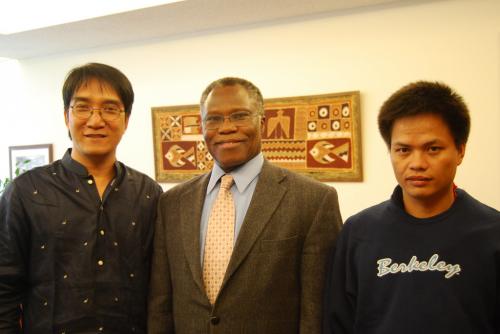 Government Panel Says Sorry for 20-year delayed report, Lectures UNCAT on Philippine Lawmaking Instead
Government Panel Says Sorry for 20-year delayed report, Lectures UNCAT on Philippine Lawmaking Instead
Geneva, Switzerland –The two hour session provided for the Philippine government replies to issues raised by the members of the United Nations Committee Against Torture (UN CAT) in its 42nd Session turned into a class on Political Science 101. Frustration seemed to be written on the faces of the Committee members who were given a textbook lecture by the government panel which included how laws are made in the Philippines. The only truth that has come out is the fact that the government has gone far away from complying with the Convention against Torture and other Cruel, Inhuman or Degrading Treatment or Punishment which it acceded to in 1986.
 Government Panel Says Sorry for 20-year delayed report, Lectures UNCAT on Philippine Lawmaking Instead
Government Panel Says Sorry for 20-year delayed report, Lectures UNCAT on Philippine Lawmaking Instead
Geneva, Switzerland –The two hour session provided for the Philippine government replies to issues raised by the members of the United Nations Committee Against Torture (UN CAT) in its 42nd Session turned into a class on Political Science 101. Frustration seemed to be written on the faces of the Committee members who were given a textbook lecture by the government panel which included how laws are made in the Philippines. The only truth that has come out is the fact that the government has gone far away from complying with the Convention against Torture and other Cruel, Inhuman or Degrading Treatment or Punishment which it acceded to in 1986.
Ambassador Erlinda Basilio, permanent representative of the Philippines to the UN in Geneva apologized for having taken 20 years to submit a report to the Committee due to “natural and man-made calamities.”
Even with so many speakers from the 27-member delegation of the Philippines, no honest-to-goodness answer has come out of their lengthy presentation that would sincerely respond to the issues raised by the Committee members and address the use of torture by state security forces in the country.
Executive Secretary Eduardo Ermita who headed the delegation in his closing words boasted of a so-called “fruitful and constructive dialogue” between the CAT and the Philippines delegation. But human rights groups and NGO observers are at a loss as to what dialogue he is referring to.
Torture survivors farmer Raymond Manalo and United Church of Christ in the Philippines (UCCP) Pastor Berlin Guerrero who were present at the CAT session together with Karapatan secretary general Marie Hilao Enriquez, Karapatan special legal consultant on UN mechanisms lawyer Edre Olalia, Karapatan intern Trisha Garvida and other NGO representatives observed how the government panel led by Ermita shamelessly evaded the issues and cover up the reality of torture in the country.
Ermita even incorrigibly took a dig at Karapatan and other human rights defenders by casting aspersions on their motives rather than facing the reports and reality of a consistent pattern of – in the words of some Committee members themselves – the “widespread practice of torture” as illustrated by a “morass of cases.”
“Inubos nila ang oras sa pagle-lecture!” (They [government delegation] used up all the time for lectures!), said Manalo who hoped for something good to come out of his trip to Geneva. “What will happen now to the cases of Sherlyn Cadapan, Karren Empeno and Tatay Manuel Merino? How can justice be served to these people?”
Ermita deftly led his platoon of generals, colonels, bureaucrats, technicians and lawyers under his baton in their individual roleplaying and consumed almost all the time for the whole session and left the Committee members with little time to ask more searching and probing questions even after being reminded a couple of times. It was pretty obvious to the Philippine and international NGOs that the Philippine delegation was just “dribbling” the time away to avoid being put to task its general and high-falluting replies spruced up with cute acronyms that – in the words of another Committee – have “nothing on the practical side” and have no value on the ground.
For his part, Guerrero said he believed the Committee will see through the bunch of lies and pretensions that the Gloria Arroyo administration is employing to cover up its non-compliance with the convention and other human rights instruments.
In her assessment, Enriquez said, “A lot of substantial questions specially coming from the Committee rapporteurs were not responded to by the panel. One is in the area of protection of human rights defenders and another area is on administrative actions against erring elements of the AFP and PNP. What bothers me is their wrong interpretation of human rights and who is culpable if such is violated. The Philippine state is still hiding behind a narrow self-serving and even distorted understanding of human rights.” #
